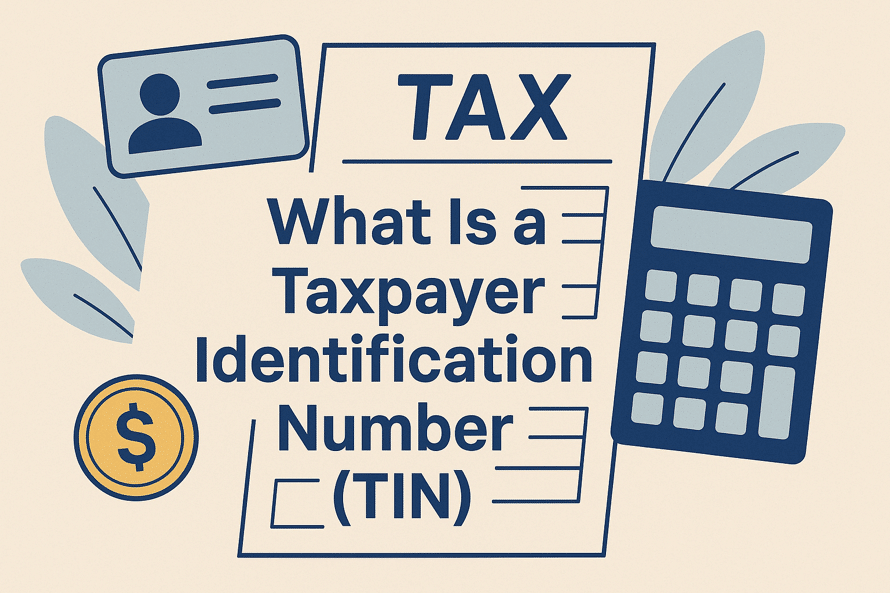What is a Taxpayer Identification Number (TIN)? Definition, Usage, and Country-Wise Differences

The Taxpayer Identification Number (TIN) is explicitly created for tax purposes for individuals or businesses. It supports the government in monitoring tax liabilities. TIN is primarily used by registered companies with VAT or CST in India. The number is required for buying and selling goods and services. Respective state governments allot the TIN, and the number is not the same across states.
If you are wondering what is TIN, it is just a number that identifies a taxpayer. All businesses in the country are required to have a Taxpayer Identification Number (TIN) to remain compliant with tax regulations. This also makes it easier to track transactions and prevent tax fraud. The GST system has now made GSTIN the standard alternative to TIN.
TIN Explained: What Does It Stand For?
TIN is short for Taxpayer Identification Number. Every business signing up for VAT (Value Added Tax) or CST (Central Sales Tax) is allotted one number. When you ask what is TIN, it means a number that helps the government follow and control sales and purchase taxes.
Definition and Global Importance of TIN
TIN helps identify individuals who pay taxes and maintains records of their VAT activities. TIN is an 11-digit code, where the last two digits stand for the applicant’s state. In India, the respective state’s Commercial Tax Department allocates a TIN to businesses. TIN is essential for the following reasons:
· Handling VAT returns
· Gaining the official status for input tax credit
· Ensuring compliance with tax laws
How TIN Varies Across Countries
Across the world, TIN systems are the same, but the details and names may be different. For example, TIN (Taxpayer Identification Number) or EIN (Employer Identification Number) is the name for it in the US.
In the UK, it forms part of the Unique Taxpayer Reference (UTR). Every country shapes TIN according to its tax system, but its primary goal is to identify individuals who pay taxes and support tax collection.
Types of Taxpayer Identification Numbers in the US
The IRS in the US uses a Taxpayer Identification Number (TIN) to monitor what each person pays in taxes. If you want to understand what is TIN, it is just a number used to identify people or businesses when filing taxes.
Social Security Number (SSN)
US citizens and eligible non-citizens are given an SSN. The majority of people have a Taxpayer Identification Number (TIN). People need to use it for taxes, employment matters, and benefits.
Employer Identification Number (EIN)
An EIN is allotted to businesses, estates, and trusts. An EIN is required to handle business taxes, add new staff members, and create a business account at the bank.
Individual Taxpayer Identification Number (ITIN)
People who cannot obtain an SSN are allotted ITIN.
Other TINs: ATIN and PTIN
An ATIN or Adoption Taxpayer Identification Number, is used for children during the adoption process. People who prepare taxes for a fee are required to have a Preparer Tax Identification Number (PTIN). There is a specific purpose for every Taxpayer Identification Number (TIN).
What Was TIN in India and Why Did It Change?
Before GST was introduced, India used a tax collection method called TIN. Businesses found it to be essential. Understanding what is TIN makes it easier to understand taxes better.
TIN Under the VAT System (Pre-2017)
This is a number that has 11 digits. Value Added Tax (VAT) is required for the issuance of Tax Identification Numbers (TINs) for businesses. Businesses that sold products in a state were required to get a TIN. The state government used it to keep track of sales and collect the appropriate taxes. In each state, the TIN differs from that in other states and is issued by the state’s Commercial Tax Department.
GSTIN Replacing TIN for Most Businesses
In July 2017, India implemented a single tax system called GST nationwide. The need for VAT in the states was eliminated after the introduction of GST. Now, all businesses have to register themselves using a GSTIN. Most companies registered for goods and services are required to use a GSTIN instead of a TIN.
Where TIN Still Applies (Alcohol, Petroleum, Electricity)
TIN still exists, although it has been changed. GST does not currently include items such as alcohol, petroleum products, and electricity. State governments tax the sales of these. Thus, companies trading in these goods are required to understand what TIN is, to register for VAT.
TIN vs PAN, TAN, and GSTIN in India: What’s the Difference?
India uses different tax identification numbers for various reasons. Once this difference is understood, companies can file taxes accurately and comply with regulations.
A Side-by-Side Comparison
| Identifier | Full Form | Purpose | Format | Used By |
| TIN | Taxpayer Identification Number | Used under the VAT system (pre-GST) | 11-character alphanumeric number | Dealers under VAT, CST |
| PAN | Permanent Account Number | For tracking financial transactions | 10-character alphanumeric number | Individuals, Companies |
| TAN | Tax Dedication and Collection Account Number | Required for TDS/TCS | 10-character alphanumeric | Employers, Deductors |
| GSTIN | Goods and Services Tax Identification Number | For GST compliance | 15-character alphanumeric | Registered GST taxpayers |
When to Use Each Tax Identifier
Before GST was introduced, the primary method of collecting sales tax was through TIN. Now, the most critical indirect taxes are identified by GSTIN numbers.
PAN helps open a bank account, pay taxes, and make significant transactions. TAN is needed when you deduct TDS or collect TCS. A company that withholds tax on employee salaries must provide its TAN.
Having a GSTIN is required for all registered GST businesses. It should be mentioned on invoices and for filing GST returns. Now, TIN only covers areas that are not subject to GST, including petroleum, alcohol, and electricity.
Applying for a TIN: Processes in the US and India
Both US and India require a Taxpayer Identification Number (TIN) for handling taxes.
Application Requirements and Forms (SS-5, W-7, etc.)
Based on the type of TIN, different forms must be used in the US. SS-5 gives instructions on how to get a Social Security Number (SSN). The W-7 form can be used to get an Individual Taxpayer Identification Number (ITIN) when you are not able to get an SSN. Applicants must present their identification papers and legal immigration documents. Taxes can be filed with the IRS or a representative approved by the IRS.
State-Level TIN Application for VAT Items in India
When dealing with VAT, businesses based in India need to obtain a TIN at the state level. On the website of the Commercial Tax Department in the respective state, you can apply for a dealer’s license online. You are required to show business registration, identity proof, and proof of your address.
TIN Tracking and Verification Methods
TINs can be checked through the TIN Matching Program available at the IRS in the US. To check a TIN in India, log in to the Income Tax or State VAT website and use the personal identification number (PAN) or the respective TIN.
Real-World Examples of TIN
Anyone who has to pay taxes, whether as an individual or a business, can use a TIN. When combined with letters and numbers, this number confirms that a taxpayer is registered in the tax authority’s database.
How TIN Is Used in US Federal Tax Filing
Individuals use their Social Security Number (SSN) when filing income tax returns with the IRS. This makes it easier for the IRS to verify your income and deductions. Your employer uses your SSN on your W-2 form when reporting your earnings. Businesses use an Employer Identification Number (EIN) for payroll taxes and corporate returns. Non-resident aliens use an Individual Taxpayer Identification Number (ITIN) for tax purposes.
TIN Relevance for Legacy VAT Records in India
Even after India transitioned to GST in 2017, the TIN remains vital for legacy VAT records. Before the introduction of GST, businesses had a state-specific Taxpayer Identification Number (TIN) for VAT purposes. It meant it was possible to complete VAT returns and obtain input tax credits. Whenever a dispute is settled or an audit is done for past transactions, it is crucial to use the old VAT TINs to access the relevant data.
Institutional Use: Banks, Employers, Government Agencies
Banks collect TINs (SSN, EIN, ITIN) from customers for account opening and reporting interest income to the IRS, complying with regulations like the Bank Secrecy Act. The reporting of interest on your savings account is done using your Social Security number by the bank. Employers are legally required to collect Social Security numbers (SSNs) from employees to report wages and tax withholdings, issuing W-2 forms annually. Government agencies use TINs for Social Security benefits, Medicare, and other programs.
Conclusion: Is TIN Still Relevant Today?
The Taxpayer Identification Number (TIN) remains highly relevant today, serving as an indispensable tool in modern financial and governmental systems. From facilitating accurate tax collection by agencies like the IRS to assisting in the reconciliation of legacy financial records, TINs provide the unique identification necessary for accountability and transparency.
Moreover, people rely on accounting for reporting their finances, paying employees, and handling social programs by government agencies, which helps ensure that things are run smoothly, clearly, and efficiently.
FAQs
1. What is a TIN used for in the US and India?
In the US, a TIN identifies individuals and entities for tax purposes. In India, a TIN is used primarily for tracking VAT-related transactions for businesses.
2. Is TIN the same as PAN or GSTIN in India?
TIN is not the same as PAN or GSTIN in India. PAN is for income tax, and GSTIN is for GST, while TIN broadly refers to the tax information network.
3. Who needs an ITIN in the United States?
Individuals who do not have, and are not eligible to obtain, a Social Security Number (SSN) but are required to file US tax returns need an Individual Taxpayer Identification Number (ITIN).
4. Is TIN still used in India after GST?
TIN is still in use for handling different tax matters and systems in India. Thus, the old VAT TIN numbers were replaced with GSTIN after the introduction of GST.
5. How can I check my TIN status online?
The PAN and GSTIN numbers in India are verified through the official portals of the respective tax organizations. There is no single check that can determine a person’s TIN status.
6. Can individuals have a Tax Identification Number (TIN) in India?
Yes, people and businesses in India are given this special code by the government. It enables the recognition and follow-up with taxpayers who do not comply with the rules.
7. Do NRIs need a TIN to file taxes?
NRIs typically need a PAN to file income tax returns in India if they have taxable income originating in India.
8. Where can I find my TIN on tax documents?
After the tax authority approves the registration form, the Commercial Tax Department allots the TIN. The applicant can receive the VAT registration certificate with the 11-digit TIN after completing the process.
Disclaimer
The stocks mentioned in this article are not recommendations. Please conduct your own research and due diligence before investing. Investment in securities market are subject to market risks, read all the related documents carefully before investing. Please read the Risk Disclosure documents carefully before investing in Equity Shares, Derivatives, Mutual fund, and/or other instruments traded on the Stock Exchanges. As investments are subject to market risks and price fluctuation risk, there is no assurance or guarantee that the investment objectives shall be achieved. Lemonn (Formerly known as NU Investors Technologies Pvt. Ltd) do not guarantee any assured returns on any investments. Past performance of securities/instruments is not indicative of their future performance.







